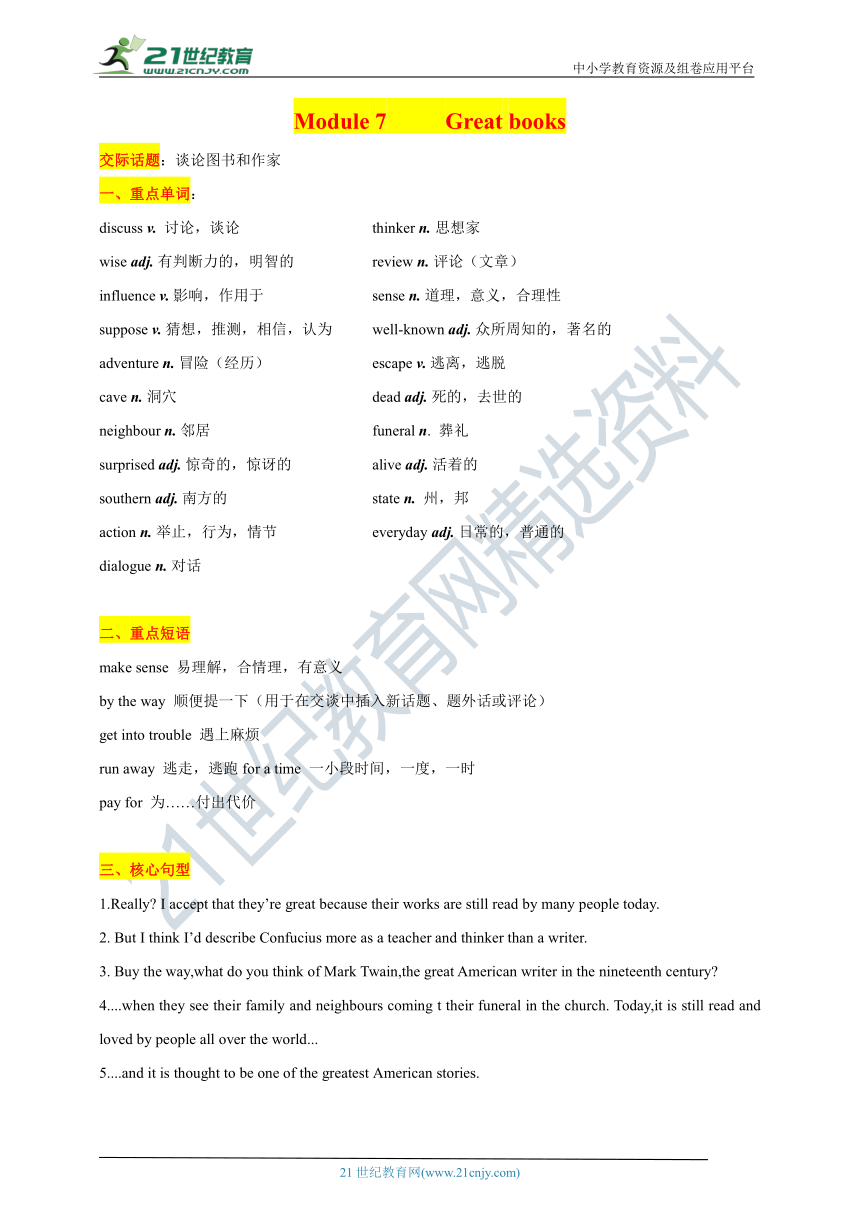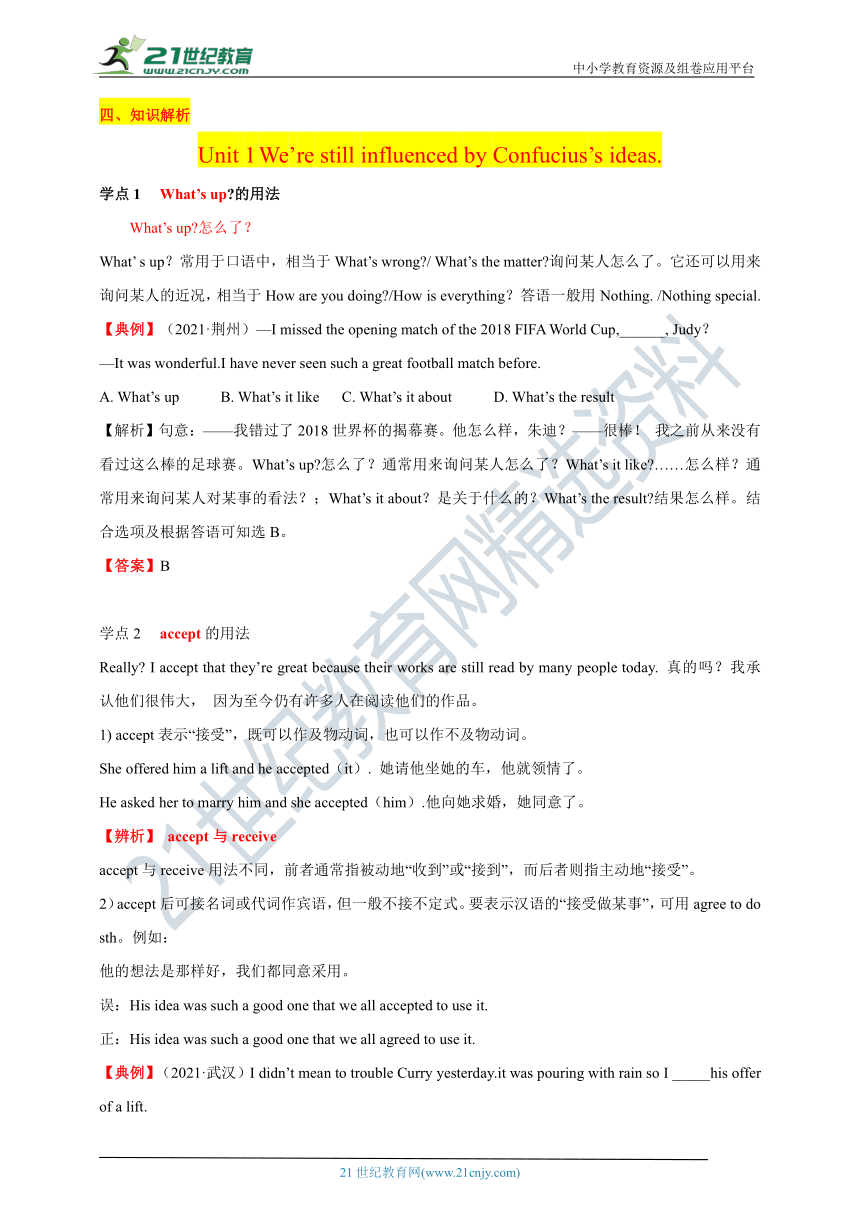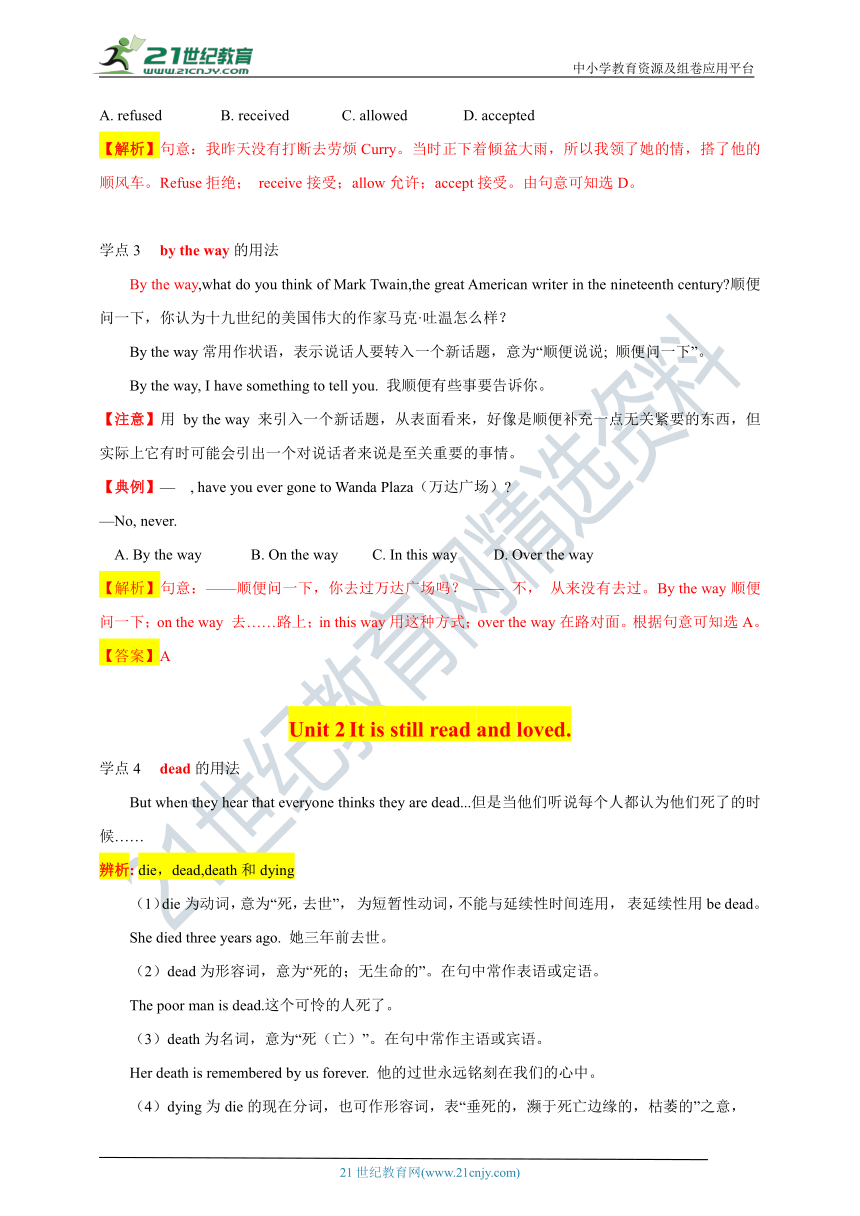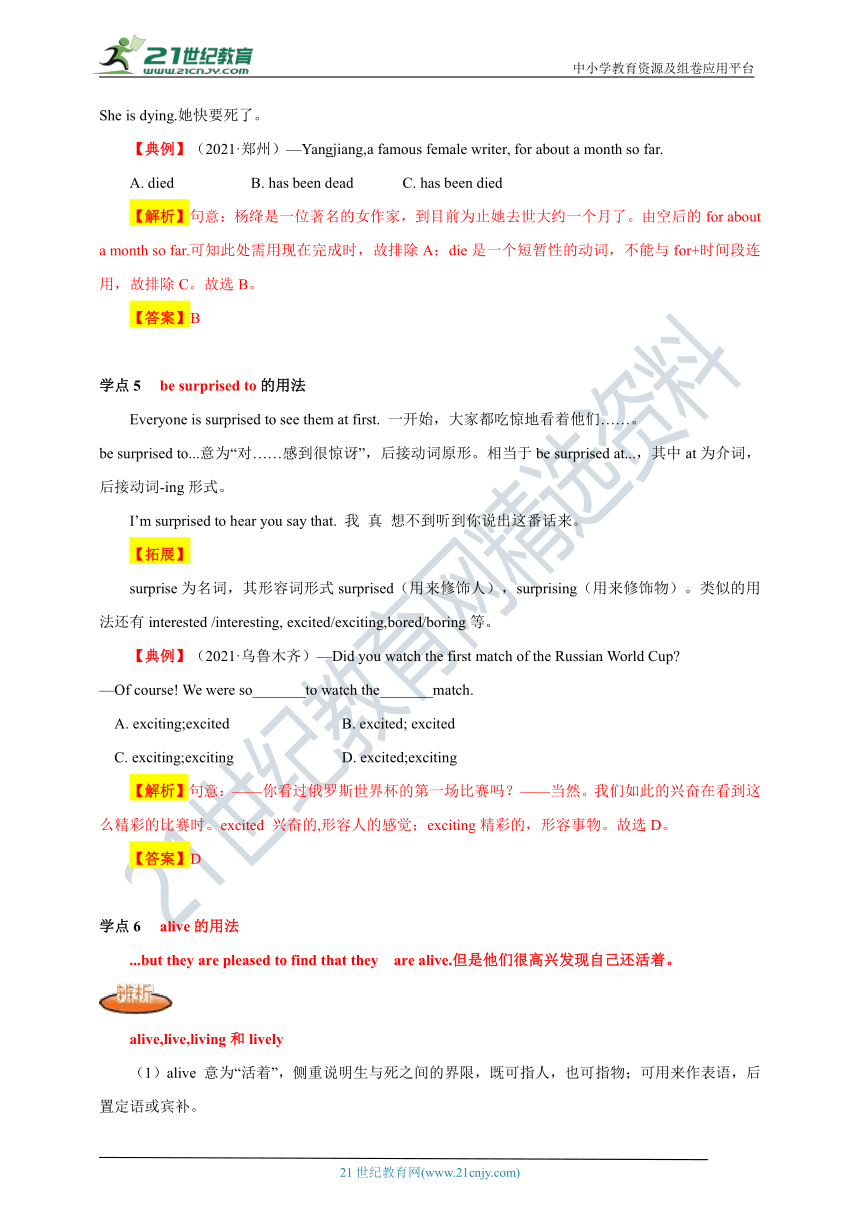Module 7 Great books 精讲学案
文档属性
| 名称 | Module 7 Great books 精讲学案 |  | |
| 格式 | doc | ||
| 文件大小 | 1.2MB | ||
| 资源类型 | 试卷 | ||
| 版本资源 | 外研版 | ||
| 科目 | 英语 | ||
| 更新时间 | 2021-09-01 12:50:28 | ||
图片预览




文档简介
中小学教育资源及组卷应用平台
Module
7
Great
books
交际话题:谈论图书和作家
一、重点单词:
discuss?v.
讨论,谈论
thinker?n.?思想家
wise?adj.?有判断力的,明智的
review?n.?评论(文章)
influence?v.?影响,作用于
sense?n.?道理,意义,合理性
suppose?v.?猜想,推测,相信,认为
well-known?adj.?众所周知的,著名的
adventure?n.?冒险(经历)
escape?v.?逃离,逃脱
cave
n.?洞穴
dead?adj.?死的,去世的
neighbour
n.?邻居
funeral?n.
葬礼
surprised?adj.?惊奇的,惊讶的
alive?adj.?活着的
southern?adj.?南方的
state?n.
州,邦
action?n.?举止,行为,情节
everyday?adj.?日常的,普通的
dialogue?n.?对话
二、重点短语
make
sense
易理解,合情理,有意义
by
the
way
顺便提一下(用于在交谈中插入新话题、题外话或评论)
get
into
trouble
遇上麻烦
run
away
逃走,逃跑for
a
time
一小段时间,一度,一时
pay
for
为……付出代价
三、核心句型
1.Really?
I?accept?that?they’re?great?because?their?works?are?still?read?by?many?people?today.
2.
But
I
think
I’d
describe
Confucius
more
as
a
teacher
and
thinker
than
a?writer.
3.
Buy
the
way,what
do
you
think
of
Mark
Twain,the
great
American
writer
in
the
nineteenth
century?
4....when
they
see
their
family
and
neighbours
coming
t
their
funeral
in
the
church.
Today,it
is
still
read
and
loved
by
people
all
over
the?world...
5....and?it?is?thought?to?be?one?of?the?greatest?American?stories.
四、知识解析
Unit
1
We’re
still
influenced
by
Confucius’s
ideas.
学点1
What’s
up?的用法
What’s
up?怎么了?
What’
s
up?常用于口语中,相当于What’s
wrong?/
What’s
the
matter?询问某人怎么了。它还可以用来询问某人的近况,相当于How
are
you
doing?/How
is
everything?答语一般用Nothing.
/Nothing
special.
【典例】(2021·荆州)—I
missed
the
opening
match
of
the
2018
FIFA
World
Cup,______,
Judy?
—It
was
wonderful.I
have
never
seen
such
a
great
football
match
before.
A.
What’s
up
B.
What’s
it
like
C.
What’s
it
about
D.
What’s
the
result
【解析】句意:——我错过了2018世界杯的揭幕赛。他怎么样,朱迪?——很棒!
我之前从来没有看过这么棒的足球赛。What’s
up?怎么了?通常用来询问某人怎么了?What’s
it
like?……怎么样?通常用来询问某人对某事的看法?;What’s
it
about?是关于什么的?What’s
the
result?结果怎么样。结合选项及根据答语可知选B。
【答案】B
学点2
accept的用法
Really?
I
accept
that
they’re
great
because
their
works
are
still
read
by
many
people
today.
真的吗?我承认他们很伟大,
因为至今仍有许多人在阅读他们的作品。
1)
accept表示“接受”,既可以作及物动词,也可以作不及物动词。
She
offered
him
a
lift
and
he
accepted(it).
她请他坐她的车,他就领情了。
He
asked
her
to
marry
him
and
she
accepted(him).他向她求婚,她同意了。
【辨析】
accept与receive
accept与receive用法不同,前者通常指被动地“收到”或“接到”,而后者则指主动地“接受”。
2)accept后可接名词或代词作宾语,但一般不接不定式。要表示汉语的“接受做某事”,可用agree
to
do
sth。例如:
他的想法是那样好,我们都同意采用。
误:His
idea
was
such
a
good
one
that
we
all
accepted
to
use
it.
正:His
idea
was
such
a
good
one
that
we
all
agreed
to
use
it.
【典例】(2021·武汉)I
didn’t
mean
to
trouble
Curry
yesterday.it
was
pouring
with
rain
so
I
_____his
offer
of
a
lift.
A.
refused
B.
received
C.
allowed
D.
accepted
【解析】句意:我昨天没有打断去劳烦Curry。当时正下着倾盆大雨,所以我领了她的情,搭了他的顺风车。Refuse拒绝;
receive接受;allow允许;accept接受。由句意可知选D。
学点3
by
the
way的用法
By
the
way,what
do
you
think
of
Mark
Twain,the
great
American
writer
in
the
nineteenth
century?顺便问一下,你认为十九世纪的美国伟大的作家马克·吐温怎么样?
By
the
way常用作状语,表示说话人要转入一个新话题,意为“顺便说说;
顺便问一下”。
By
the
way,
I
have
something
to
tell
you.
我顺便有些事要告诉你。
【注意】用
by
the
way
来引入一个新话题,从表面看来,好像是顺便补充一点无关紧要的东西,但实际上它有时可能会引出一个对说话者来说是至关重要的事情。
【典例】—
,
have
you
ever
gone
to
Wanda
Plaza(万达广场)?
—No,
never.
A.
By
the
way
B.
On
the
way
C.
In
this
way
D.
Over
the
way
【解析】句意:——顺便问一下,你去过万达广场吗?
——
不,
从来没有去过。By
the
way顺便问一下;on
the
way
去……路上;in
this
way用这种方式;over
the
way在路对面。根据句意可知选A。
【答案】A
Unit
2
It
is
still
read
and
loved.
学点4
dead的用法
But
when
they
hear
that
everyone
thinks
they
are
dead...但是当他们听说每个人都认为他们死了的时候……
辨析:
die,dead,death和dying
(1)die为动词,意为“死,去世”,
为短暂性动词,不能与延续性时间连用,
表延续性用be
dead。
She
died
three
years
ago.
她三年前去世。
(2)dead为形容词,意为“死的;无生命的”。在句中常作表语或定语。
The
poor
man
is
dead.这个可怜的人死了。
(3)death为名词,意为“死(亡)”。在句中常作主语或宾语。
Her
death
is
remembered
by
us
forever.
他的过世永远铭刻在我们的心中。
(4)dying为die的现在分词,也可作形容词,表“垂死的,濒于死亡边缘的,枯萎的”之意,
She
is
dying.她快要死了。
【典例】(2021·郑州)—Yangjiang,a
famous
female
writer,
for
about
a
month
so
far.
A.
died
B.
has
been
dead
C.
has
been
died
【解析】句意:杨绛是一位著名的女作家,到目前为止她去世大约一个月了。由空后的for
about
a
month
so
far.可知此处需用现在完成时,故排除A;die是一个短暂性的动词,不能与for+时间段连用,故排除C。故选B。
【答案】B
学点5
be
surprised
to的用法
Everyone
is
surprised
to
see
them
at
first.
一开始,大家都吃惊地看着他们……。
be
surprised
to...意为“对……感到很惊讶”,后接动词原形。相当于be
surprised
at...,其中at为介词,后接动词-ing形式。
I’m
surprised
to
hear
you
say
that.
我
真
想不到听到你说出这番话来。
【拓展】
surprise为名词,其形容词形式surprised(用来修饰人),surprising(用来修饰物)。类似的用法还有interested
/interesting,
excited/exciting,bored/boring等。
【典例】(2021·乌鲁木齐)—Did
you
watch
the
first
match
of
the
Russian
World
Cup?
—Of
course!
We
were
so_______to
watch
the_______match.
A.
exciting;excited
B.
excited;
excited
C.
exciting;exciting
D.
excited;exciting
【解析】句意:——你看过俄罗斯世界杯的第一场比赛吗?——当然。我们如此的兴奋在看到这么精彩的比赛时。excited
兴奋的,形容人的感觉;exciting精彩的,形容事物。故选D。
【答案】D
学点6
alive的用法
...but
they
are
pleased
to
find
that
they
are
alive.但是他们很高兴发现自己还活着。
alive,live,living和lively
(1)alive
意为“活着”,侧重说明生与死之间的界限,既可指人,也可指物;可用来作表语,后置定语或宾补。
He
is
dead
,
but
his
dog
is
still
alive
.
他死了,但他的狗仍然还活着。
(2)living意为“活着”,强调说明“尚在人间;健在”,可用来指人或物,作定语或表语。
My
first
teacher
is
still
living
.
我的启蒙老师仍健在。
【注意】living
前加上
the
,
表示类别,
指“活着的人们”。
The
living
must
?nish
the
work
of
those
dead
.
活着的人必须完成那些死去的人的事业。
(3)live
意为“活着的”,通常指物,
不指人,常用来作定语放名词的前面。还指“实况转播的”。例如:
Do
you
like
a
live
show
or
a
recorded
show?你是喜欢直播还是录音。
He
said
he
had
seen
a
live
whale.他说他看见过活鲸鱼。
(5)lively
意为“
活泼的”,“
活跃”,“充满生气的”,可作定语、表语或宾补,既可指人,又可指物。例如:
He
had
a
strange
way
of
making
his
classes
lively
and
interesting.他有一种奇特的方法,使他的课生动有趣。
【典例】根据汉语意思完成句子。
当我赶到医院的时候,她还活着。She
was______
______when
I
entered
the
hospital.
【解析】alive可以作表语,表示“活着的”。
【答案】still
alive
学点7
pay
for的用法。
...how
people
love
each
other
and
how
bad
people
pay
for
their
actions.……人们如何彼此相爱以及坏人如何为他们得行为付出代价。
(1)pay用作及物动词时,后面接表示人的词语,即pay
s
b.
意为“付款给某人”。
I
have
to
pay
them
20
pounds.我不得不付给他们20英镑。
(2)pay
for中的pay为不及物动词,其宾语多为物,即pay
for
sth.,意为“付款买某物”;其宾语为人时,即pay
for
sb.,意为“替某人付款。”
Shall
I
pay
for
you?我替你付款好吗?
He
can’t
pay
for
the
TV
set
at
the
moment.他现在还不能给这台电视机付款。
(3)表示“给某人钱买……”,可用“pay(sb.)+钱+for
sth.”。
I
paid
the
shopkeeper
10
yuan
for
the
book.
我向店主付了十元钱买这本书。
【拓展】
表示“花费”的词语:take一般主语是物或it;spend一般主语是人,后接on
sth
或动词-ing
sth;pay一般后面跟钱数或者for
sth;cost主语也是人或物。
【典例】(2021·新疆维吾尔族自治区)—Wow.
your
sweater
is
very
beautiful!How
much
is
it?
—Thank
you.
It_______
_______me
30
dollars.
A.
spend
B.
paid
C.
cost
D.
take
【解析】句意:——哇!你的毛衣真好看。
多少钱?
——
谢谢。
3
0
美元。spend,pay,cost和take都可以表示“花费”,
take
一般主语是物或it作形式主语;spend一般主语是人,后接on
sth
或动词-ing
sth;
pay一般后面跟钱数或者for
sth;cost主语是人或物。
【答案】C
Unit
3
Language
in
use
学点8
millions
of的用法
Millions
of
people
read
Mark
Twain’s
stories
every
year.每年都有数以百万计的人读马克·吐温的故事。
millions
of意为“数百万的;数以百万计的”。表示一个大概,模糊的数量,常用来修饰可数名词的复数形式。类似的用法还有:hundreds
of;
thousands
of等。
【典例】(2021·重庆)______
visitors
came
to
take
photos
of
Hongyadong
during
the
vacation.
A.
Thousand
B.
Thousand
of
C.
Thousands
D.
Thousands
of
【解析】句意:成百上千的游客在旅游期间都来Hongyadong拍照。thousand“千”,
其前接具体的数字;thousands
of“成百上千的”,后接概数。故选D。
【答案】D
五、核心语法:
被动语态(1)
被动语态(1)——一般现在时的被动语态
1.一般现在时被动语态的构成:
英语语态有主动语态和被动语态两种。主语是动作的执行者,叫主动语态。主语是动作的承受者,叫被动语态。一般现在时的被动语态表示现在某一时间的被动动作或过去经常性、习惯性的被动动作,由“主语+be(is/am/are+)+及物动词的过去分词+by+
动作执行者”构成,无需说明动作执行者时可省去“by+动作执行者”。
The
classroom
is
cleaned(by
us).
教室被(我们)打扫。
2.一般现在时被动语态句型变换方法:be有人称、数和时态的变化,其肯定式、否定式、疑问式的变化规则与be作为连系动词时完全一样。一般疑问句将be提至句首,特殊疑问句由“特殊疑问词+一般疑问句”构成,否定句在be后加not。
English
is
widely
spoken
around
the
world.(肯定式)→English
is
not
widely
spoken.
around
the
world.(否定式)→Is
English
widely
spoken
around
the
world?(一般疑问式
)Yes,
it
is.
/No,
it
isn’t.
→What
is
widely
spoken
around
the
world?(特殊疑问句)
3.主动语态变被动语态的步骤:
主动语态:主语+及物动词谓语动词+
宾语(+其它)
被动语态:主语+be+及物动词的过去分词+by+宾语(+其它)注意:
主动、被动互转时,时态不变,但有人称和数的变化。
★主动句的主语是代词的主格形式,
变成被动态by的宾语时,要用宾格形式。
★主动句的宾语是代词的宾格形式,
变成被动时,要转换为主格。
People
grow
rice
in
the
south.
Rice
is
grown(by
people)in
the
south.
She
takes
care
of
the
baby.
The
baby
is
taken
care
of
(by
her).
核心素养在线
本模块谈论名著,核心素养主要体现在对学生进行融入国际文化、开启心智,
渗透人文关怀等方面的文化品格培养。中央电视台《经典咏流传》节目的播出,再次激发了人们对经典
文学作品的阅读热情。你喜欢阅读哪些书呢?
(2018·泰安)中央电视台《经典咏流传》节目的播出,再次激发了人们对经典文学作品的阅读热情。读书可以成就更美好的自己,让读书伴随我们成长。请根据以下要点提示,
以“
Growing
up
with
Reading”为题写一篇英语短文介绍你曾经读过的一本书或—首诗,并建议大家多读书,读好书。要点提示:
读书的重要性
1.
获取知识,开阔眼界;
2.
提升自我,增强自信……
读过的一本书或一首诗
1.
作品内容简介;
2.
读书感悟及对自己的影响。
多读书,读好书
1.
利用闲暇时间多读书,养成读书的好习惯;
2.
多读经典文学作品……
【注意】
1.短文应包括以上要点,可适当发挥,以使行文连贯。
2.文中不得出现自己的真实姓名、学校及地名。
3.词数:80-100(文章开头已给出,不计入总词数)。
参考词汇:classic经典作品;open
up
one’s
eyes
开阔眼界;improve
oneself
提升自我;be
more
confident
更自信;responsibility责任;cooperation合作。
Growing
up
with
Reading
Have
you
watched
the
program
Everlasting
Classics
on
CCTV?This
program
makes
us
more
interested
in
reading
books,
especially
classics.
Reading
is
very
important.
We
can
get
knowledge
through
reading.
It
can
not
only
open
our
minds,
but
also
make
us
cleverer
and
more
confident
.
Our
study
can
be
improved
if
we
read
more
good
books.
These
days
I
am
reading
a
book
whose
title
is
Jane
Eyre,
which
attracts
me
a
lot.
The
book’s
writer
is
called
Charlotte
Bronte,
who
was
born
in
England
in
1816.She
had
two
sisters
and
one
brother,
but
unfortunately
their
mother
died
when
they
were
very
young.
Actually
Jane
Eyre
is
a
book
whose
theme
is
of
love.
In
the
story.
Jane
Eyre
lived
a
hard
life,
but
she
was
self-
confident
and
perseverant.
In
her
heart,
there
is
always
a
mind
that
if
you
hold
a
belief
and
stick
to
it,
you
will
eventually
achieve
your
dream.
【解析】这是一篇图表,要求介绍自己读过的一本书。动笔前先要认真阅读要点,
围绕要点组织材料,然后用正确的英语句子把这些内容表达出来,在此基础上亦可适当发挥,注意不要遗漏材料中给出的要点。根据材料可知本文主要是应用第一,三人称,一般现在时态和过去时态,注意标点符号及大小写等问题,不要犯语法错误。注意上下文之间的逻辑关系,语意连贯。
21世纪教育网
www.21cnjy.com
精品试卷·第
2
页
(共
2
页)
HYPERLINK
"http://21世纪教育网(www.21cnjy.com)
"
21世纪教育网(www.21cnjy.com)
Module
7
Great
books
交际话题:谈论图书和作家
一、重点单词:
discuss?v.
讨论,谈论
thinker?n.?思想家
wise?adj.?有判断力的,明智的
review?n.?评论(文章)
influence?v.?影响,作用于
sense?n.?道理,意义,合理性
suppose?v.?猜想,推测,相信,认为
well-known?adj.?众所周知的,著名的
adventure?n.?冒险(经历)
escape?v.?逃离,逃脱
cave
n.?洞穴
dead?adj.?死的,去世的
neighbour
n.?邻居
funeral?n.
葬礼
surprised?adj.?惊奇的,惊讶的
alive?adj.?活着的
southern?adj.?南方的
state?n.
州,邦
action?n.?举止,行为,情节
everyday?adj.?日常的,普通的
dialogue?n.?对话
二、重点短语
make
sense
易理解,合情理,有意义
by
the
way
顺便提一下(用于在交谈中插入新话题、题外话或评论)
get
into
trouble
遇上麻烦
run
away
逃走,逃跑for
a
time
一小段时间,一度,一时
pay
for
为……付出代价
三、核心句型
1.Really?
I?accept?that?they’re?great?because?their?works?are?still?read?by?many?people?today.
2.
But
I
think
I’d
describe
Confucius
more
as
a
teacher
and
thinker
than
a?writer.
3.
Buy
the
way,what
do
you
think
of
Mark
Twain,the
great
American
writer
in
the
nineteenth
century?
4....when
they
see
their
family
and
neighbours
coming
t
their
funeral
in
the
church.
Today,it
is
still
read
and
loved
by
people
all
over
the?world...
5....and?it?is?thought?to?be?one?of?the?greatest?American?stories.
四、知识解析
Unit
1
We’re
still
influenced
by
Confucius’s
ideas.
学点1
What’s
up?的用法
What’s
up?怎么了?
What’
s
up?常用于口语中,相当于What’s
wrong?/
What’s
the
matter?询问某人怎么了。它还可以用来询问某人的近况,相当于How
are
you
doing?/How
is
everything?答语一般用Nothing.
/Nothing
special.
【典例】(2021·荆州)—I
missed
the
opening
match
of
the
2018
FIFA
World
Cup,______,
Judy?
—It
was
wonderful.I
have
never
seen
such
a
great
football
match
before.
A.
What’s
up
B.
What’s
it
like
C.
What’s
it
about
D.
What’s
the
result
【解析】句意:——我错过了2018世界杯的揭幕赛。他怎么样,朱迪?——很棒!
我之前从来没有看过这么棒的足球赛。What’s
up?怎么了?通常用来询问某人怎么了?What’s
it
like?……怎么样?通常用来询问某人对某事的看法?;What’s
it
about?是关于什么的?What’s
the
result?结果怎么样。结合选项及根据答语可知选B。
【答案】B
学点2
accept的用法
Really?
I
accept
that
they’re
great
because
their
works
are
still
read
by
many
people
today.
真的吗?我承认他们很伟大,
因为至今仍有许多人在阅读他们的作品。
1)
accept表示“接受”,既可以作及物动词,也可以作不及物动词。
She
offered
him
a
lift
and
he
accepted(it).
她请他坐她的车,他就领情了。
He
asked
her
to
marry
him
and
she
accepted(him).他向她求婚,她同意了。
【辨析】
accept与receive
accept与receive用法不同,前者通常指被动地“收到”或“接到”,而后者则指主动地“接受”。
2)accept后可接名词或代词作宾语,但一般不接不定式。要表示汉语的“接受做某事”,可用agree
to
do
sth。例如:
他的想法是那样好,我们都同意采用。
误:His
idea
was
such
a
good
one
that
we
all
accepted
to
use
it.
正:His
idea
was
such
a
good
one
that
we
all
agreed
to
use
it.
【典例】(2021·武汉)I
didn’t
mean
to
trouble
Curry
yesterday.it
was
pouring
with
rain
so
I
_____his
offer
of
a
lift.
A.
refused
B.
received
C.
allowed
D.
accepted
【解析】句意:我昨天没有打断去劳烦Curry。当时正下着倾盆大雨,所以我领了她的情,搭了他的顺风车。Refuse拒绝;
receive接受;allow允许;accept接受。由句意可知选D。
学点3
by
the
way的用法
By
the
way,what
do
you
think
of
Mark
Twain,the
great
American
writer
in
the
nineteenth
century?顺便问一下,你认为十九世纪的美国伟大的作家马克·吐温怎么样?
By
the
way常用作状语,表示说话人要转入一个新话题,意为“顺便说说;
顺便问一下”。
By
the
way,
I
have
something
to
tell
you.
我顺便有些事要告诉你。
【注意】用
by
the
way
来引入一个新话题,从表面看来,好像是顺便补充一点无关紧要的东西,但实际上它有时可能会引出一个对说话者来说是至关重要的事情。
【典例】—
,
have
you
ever
gone
to
Wanda
Plaza(万达广场)?
—No,
never.
A.
By
the
way
B.
On
the
way
C.
In
this
way
D.
Over
the
way
【解析】句意:——顺便问一下,你去过万达广场吗?
——
不,
从来没有去过。By
the
way顺便问一下;on
the
way
去……路上;in
this
way用这种方式;over
the
way在路对面。根据句意可知选A。
【答案】A
Unit
2
It
is
still
read
and
loved.
学点4
dead的用法
But
when
they
hear
that
everyone
thinks
they
are
dead...但是当他们听说每个人都认为他们死了的时候……
辨析:
die,dead,death和dying
(1)die为动词,意为“死,去世”,
为短暂性动词,不能与延续性时间连用,
表延续性用be
dead。
She
died
three
years
ago.
她三年前去世。
(2)dead为形容词,意为“死的;无生命的”。在句中常作表语或定语。
The
poor
man
is
dead.这个可怜的人死了。
(3)death为名词,意为“死(亡)”。在句中常作主语或宾语。
Her
death
is
remembered
by
us
forever.
他的过世永远铭刻在我们的心中。
(4)dying为die的现在分词,也可作形容词,表“垂死的,濒于死亡边缘的,枯萎的”之意,
She
is
dying.她快要死了。
【典例】(2021·郑州)—Yangjiang,a
famous
female
writer,
for
about
a
month
so
far.
A.
died
B.
has
been
dead
C.
has
been
died
【解析】句意:杨绛是一位著名的女作家,到目前为止她去世大约一个月了。由空后的for
about
a
month
so
far.可知此处需用现在完成时,故排除A;die是一个短暂性的动词,不能与for+时间段连用,故排除C。故选B。
【答案】B
学点5
be
surprised
to的用法
Everyone
is
surprised
to
see
them
at
first.
一开始,大家都吃惊地看着他们……。
be
surprised
to...意为“对……感到很惊讶”,后接动词原形。相当于be
surprised
at...,其中at为介词,后接动词-ing形式。
I’m
surprised
to
hear
you
say
that.
我
真
想不到听到你说出这番话来。
【拓展】
surprise为名词,其形容词形式surprised(用来修饰人),surprising(用来修饰物)。类似的用法还有interested
/interesting,
excited/exciting,bored/boring等。
【典例】(2021·乌鲁木齐)—Did
you
watch
the
first
match
of
the
Russian
World
Cup?
—Of
course!
We
were
so_______to
watch
the_______match.
A.
exciting;excited
B.
excited;
excited
C.
exciting;exciting
D.
excited;exciting
【解析】句意:——你看过俄罗斯世界杯的第一场比赛吗?——当然。我们如此的兴奋在看到这么精彩的比赛时。excited
兴奋的,形容人的感觉;exciting精彩的,形容事物。故选D。
【答案】D
学点6
alive的用法
...but
they
are
pleased
to
find
that
they
are
alive.但是他们很高兴发现自己还活着。
alive,live,living和lively
(1)alive
意为“活着”,侧重说明生与死之间的界限,既可指人,也可指物;可用来作表语,后置定语或宾补。
He
is
dead
,
but
his
dog
is
still
alive
.
他死了,但他的狗仍然还活着。
(2)living意为“活着”,强调说明“尚在人间;健在”,可用来指人或物,作定语或表语。
My
first
teacher
is
still
living
.
我的启蒙老师仍健在。
【注意】living
前加上
the
,
表示类别,
指“活着的人们”。
The
living
must
?nish
the
work
of
those
dead
.
活着的人必须完成那些死去的人的事业。
(3)live
意为“活着的”,通常指物,
不指人,常用来作定语放名词的前面。还指“实况转播的”。例如:
Do
you
like
a
live
show
or
a
recorded
show?你是喜欢直播还是录音。
He
said
he
had
seen
a
live
whale.他说他看见过活鲸鱼。
(5)lively
意为“
活泼的”,“
活跃”,“充满生气的”,可作定语、表语或宾补,既可指人,又可指物。例如:
He
had
a
strange
way
of
making
his
classes
lively
and
interesting.他有一种奇特的方法,使他的课生动有趣。
【典例】根据汉语意思完成句子。
当我赶到医院的时候,她还活着。She
was______
______when
I
entered
the
hospital.
【解析】alive可以作表语,表示“活着的”。
【答案】still
alive
学点7
pay
for的用法。
...how
people
love
each
other
and
how
bad
people
pay
for
their
actions.……人们如何彼此相爱以及坏人如何为他们得行为付出代价。
(1)pay用作及物动词时,后面接表示人的词语,即pay
s
b.
意为“付款给某人”。
I
have
to
pay
them
20
pounds.我不得不付给他们20英镑。
(2)pay
for中的pay为不及物动词,其宾语多为物,即pay
for
sth.,意为“付款买某物”;其宾语为人时,即pay
for
sb.,意为“替某人付款。”
Shall
I
pay
for
you?我替你付款好吗?
He
can’t
pay
for
the
TV
set
at
the
moment.他现在还不能给这台电视机付款。
(3)表示“给某人钱买……”,可用“pay(sb.)+钱+for
sth.”。
I
paid
the
shopkeeper
10
yuan
for
the
book.
我向店主付了十元钱买这本书。
【拓展】
表示“花费”的词语:take一般主语是物或it;spend一般主语是人,后接on
sth
或动词-ing
sth;pay一般后面跟钱数或者for
sth;cost主语也是人或物。
【典例】(2021·新疆维吾尔族自治区)—Wow.
your
sweater
is
very
beautiful!How
much
is
it?
—Thank
you.
It_______
_______me
30
dollars.
A.
spend
B.
paid
C.
cost
D.
take
【解析】句意:——哇!你的毛衣真好看。
多少钱?
——
谢谢。
3
0
美元。spend,pay,cost和take都可以表示“花费”,
take
一般主语是物或it作形式主语;spend一般主语是人,后接on
sth
或动词-ing
sth;
pay一般后面跟钱数或者for
sth;cost主语是人或物。
【答案】C
Unit
3
Language
in
use
学点8
millions
of的用法
Millions
of
people
read
Mark
Twain’s
stories
every
year.每年都有数以百万计的人读马克·吐温的故事。
millions
of意为“数百万的;数以百万计的”。表示一个大概,模糊的数量,常用来修饰可数名词的复数形式。类似的用法还有:hundreds
of;
thousands
of等。
【典例】(2021·重庆)______
visitors
came
to
take
photos
of
Hongyadong
during
the
vacation.
A.
Thousand
B.
Thousand
of
C.
Thousands
D.
Thousands
of
【解析】句意:成百上千的游客在旅游期间都来Hongyadong拍照。thousand“千”,
其前接具体的数字;thousands
of“成百上千的”,后接概数。故选D。
【答案】D
五、核心语法:
被动语态(1)
被动语态(1)——一般现在时的被动语态
1.一般现在时被动语态的构成:
英语语态有主动语态和被动语态两种。主语是动作的执行者,叫主动语态。主语是动作的承受者,叫被动语态。一般现在时的被动语态表示现在某一时间的被动动作或过去经常性、习惯性的被动动作,由“主语+be(is/am/are+)+及物动词的过去分词+by+
动作执行者”构成,无需说明动作执行者时可省去“by+动作执行者”。
The
classroom
is
cleaned(by
us).
教室被(我们)打扫。
2.一般现在时被动语态句型变换方法:be有人称、数和时态的变化,其肯定式、否定式、疑问式的变化规则与be作为连系动词时完全一样。一般疑问句将be提至句首,特殊疑问句由“特殊疑问词+一般疑问句”构成,否定句在be后加not。
English
is
widely
spoken
around
the
world.(肯定式)→English
is
not
widely
spoken.
around
the
world.(否定式)→Is
English
widely
spoken
around
the
world?(一般疑问式
)Yes,
it
is.
/No,
it
isn’t.
→What
is
widely
spoken
around
the
world?(特殊疑问句)
3.主动语态变被动语态的步骤:
主动语态:主语+及物动词谓语动词+
宾语(+其它)
被动语态:主语+be+及物动词的过去分词+by+宾语(+其它)注意:
主动、被动互转时,时态不变,但有人称和数的变化。
★主动句的主语是代词的主格形式,
变成被动态by的宾语时,要用宾格形式。
★主动句的宾语是代词的宾格形式,
变成被动时,要转换为主格。
People
grow
rice
in
the
south.
Rice
is
grown(by
people)in
the
south.
She
takes
care
of
the
baby.
The
baby
is
taken
care
of
(by
her).
核心素养在线
本模块谈论名著,核心素养主要体现在对学生进行融入国际文化、开启心智,
渗透人文关怀等方面的文化品格培养。中央电视台《经典咏流传》节目的播出,再次激发了人们对经典
文学作品的阅读热情。你喜欢阅读哪些书呢?
(2018·泰安)中央电视台《经典咏流传》节目的播出,再次激发了人们对经典文学作品的阅读热情。读书可以成就更美好的自己,让读书伴随我们成长。请根据以下要点提示,
以“
Growing
up
with
Reading”为题写一篇英语短文介绍你曾经读过的一本书或—首诗,并建议大家多读书,读好书。要点提示:
读书的重要性
1.
获取知识,开阔眼界;
2.
提升自我,增强自信……
读过的一本书或一首诗
1.
作品内容简介;
2.
读书感悟及对自己的影响。
多读书,读好书
1.
利用闲暇时间多读书,养成读书的好习惯;
2.
多读经典文学作品……
【注意】
1.短文应包括以上要点,可适当发挥,以使行文连贯。
2.文中不得出现自己的真实姓名、学校及地名。
3.词数:80-100(文章开头已给出,不计入总词数)。
参考词汇:classic经典作品;open
up
one’s
eyes
开阔眼界;improve
oneself
提升自我;be
more
confident
更自信;responsibility责任;cooperation合作。
Growing
up
with
Reading
Have
you
watched
the
program
Everlasting
Classics
on
CCTV?This
program
makes
us
more
interested
in
reading
books,
especially
classics.
Reading
is
very
important.
We
can
get
knowledge
through
reading.
It
can
not
only
open
our
minds,
but
also
make
us
cleverer
and
more
confident
.
Our
study
can
be
improved
if
we
read
more
good
books.
These
days
I
am
reading
a
book
whose
title
is
Jane
Eyre,
which
attracts
me
a
lot.
The
book’s
writer
is
called
Charlotte
Bronte,
who
was
born
in
England
in
1816.She
had
two
sisters
and
one
brother,
but
unfortunately
their
mother
died
when
they
were
very
young.
Actually
Jane
Eyre
is
a
book
whose
theme
is
of
love.
In
the
story.
Jane
Eyre
lived
a
hard
life,
but
she
was
self-
confident
and
perseverant.
In
her
heart,
there
is
always
a
mind
that
if
you
hold
a
belief
and
stick
to
it,
you
will
eventually
achieve
your
dream.
【解析】这是一篇图表,要求介绍自己读过的一本书。动笔前先要认真阅读要点,
围绕要点组织材料,然后用正确的英语句子把这些内容表达出来,在此基础上亦可适当发挥,注意不要遗漏材料中给出的要点。根据材料可知本文主要是应用第一,三人称,一般现在时态和过去时态,注意标点符号及大小写等问题,不要犯语法错误。注意上下文之间的逻辑关系,语意连贯。
21世纪教育网
www.21cnjy.com
精品试卷·第
2
页
(共
2
页)
HYPERLINK
"http://21世纪教育网(www.21cnjy.com)
"
21世纪教育网(www.21cnjy.com)
同课章节目录
- Module 1 Wonders of the world
- Unit 1 It's more than 2,000 years old.
- Unit 2 The Grand Canyon was not just big.
- Unit 3 Language in use
- Module 2 Public holidays
- Unit 1 My family always go somewhere interesting a
- Unit 2 We have celebrated the festival since the f
- Unit 3 Language in use
- Module 3 Heroes
- Unit 1 She trained hard,so she became a great play
- Unit 2There were few doctors, so he had to work ve
- Unit 3 Language in use
- Module 4 Home alone
- Unit 1 I can look after myself, although it won’t
- Unit 2 I became so bored with their orders that I
- Unit 3 Language in use
- Module 5 Museums
- Unit 1 Don't cross that rope!
- Unit 2 If you ever go to London, make sure you vis
- Unit 3 Language in use
- Module 6 Problems
- Unit 1 If I start after dinner, I'll finish it be
- Unit 2 If you tell him the truth now, you will sho
- Unit 3 Language in use
- Revision Module A
- Module 7 Great books
- Unit 1 We're still influenced by Confucius's idea
- Unit 2 It is still read and loved.
- Unit 3 Language in use
- Module 8 Sports life
- Unit 1 Daming wasn't chosen for the team last time
- Unit 2 He was invited to competitions around the w
- Unit 3 Language in use
- Module 9 Great inventions
- Unit 1 Will computers be used more than books in t
- Unit 2 Will books be replaced by the Internet?
- Unit 3 Language in use
- Module 10 Australia
- Unit 1 I have some photos that I took in Australia
- Unit 2 The game that they like most is Australian
- Unit 3 Language in use
- Module 11 Photos
- Unit 1 He's the boy who won the photo competition
- Unit 2 The photo which we liked best was taken by
- Unit 3 Language in use
- Module 12 Save our world
- Unit 1 If everyone starts to do something, the wor
- Unit 2 Repeat these three words daily: reduce, reu
- Unit 3 Language in use
- Revision Module B
